Politics and Government
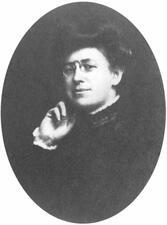
Pauline Perlmutter Steinem
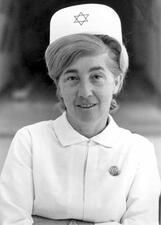
Judith Steiner-Freud
As a Holocaust survivor, Judith Steiner-Freud fulfilled her faithful and influential mission. From the 1940s to the 2010s, she devoted herself to the calling of transforming nursing into an academic profession, raising the status of Israeli nurses, and promoting the welfare of Israeli society and other diverse population groups.
Jewish Gender Stereotypes in the United States
Stereotypes of Jews have existed from their arrival in the New World to the present. Jews were portrayed as greedy, unscrupulous, and unrefined. However, Jews also created stereotypes about one another based on class, gender, and religion. Specifically, the Ghetto Girl, Jewish Mother, JAP, and others reflected tensions between genders about the place of Jews in the economy and culture.
Bessie Cleveland Stern
Bessie Cleveland Stern is most recognized for her work as statistician for the Maryland Board of Education. She collected and interpreted data about the Maryland school system from 1921 through 1948, and school officials turned to her for information to support appropriations measures and proposed changes in state laws relating to the schools.
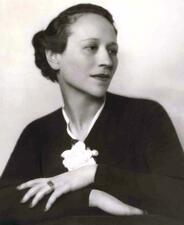
Edith Rosenwald Stern
Elizabeth Stern
Eva Michaelis Stern
Eva Michaelis Stern was co-founder and director of the fundraising arm of the Youth Aliyah in Germany, and later the director of the Youth Aliyah office in London. Over the course of WWII, she helped more than 1000 children from countries all over Europe immigrate to Palestine.
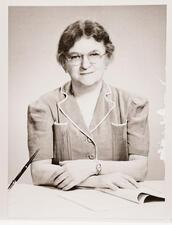
Frances Stern
Frances Stern’s experience as a second-generation American Jew dedicated to social reform and in contact with several prominent women engaged in social work led her to a career in scientific nutrition, applied dietetics, and home economics. Stern founded the Food Clinic of the Boston Dispensary, a center for dispensing practical advice on food and meal preparation for outpatients and their families that also served as a center for research on the relationships among health, nutrition, class, and ethnicity.
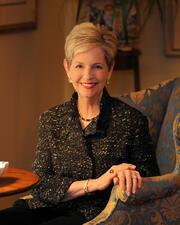
Donna Sternberg
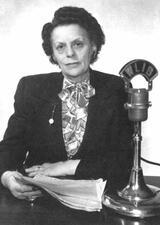
Estelle Sternberger
Believing in a future where all people had a voice and women’s work was valued, Estelle Sternberger found a myriad of ways to reshape public opinion, from hosting a political radio show to leading an organization for peace.
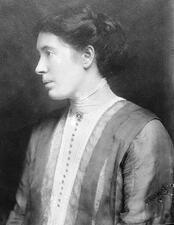
Rose Pastor Stokes
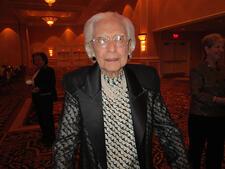
Sara Stone
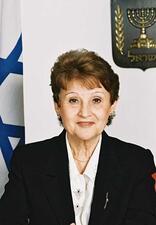
Tova Strasberg-Cohen
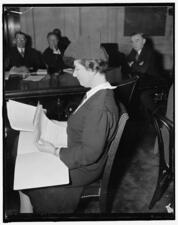
Dorothy Straus
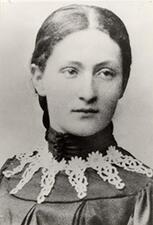
Rahel Straus
Rahel Goitein Straus, a pioneering woman medical doctor trained in Germany, was a model “New Jewish Woman” of the early-20th century. Successfully combining a career as a physician with marriage and motherhood, she committed herself to Jewish and feminist causes and organizations throughout her life, while also embracing Zionist ideals.
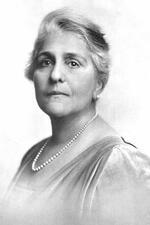
Sarah Lavanburg Straus
With the support of philanthropist Baroness Clara de Hirsch, Sarah Lavanburg Straus helped to establish two homes for immigrant girls in New York City early in the twentieth century.
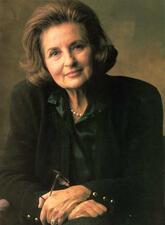
Annette Greenfield Strauss
Lillian Laser Strauss
Lillian Laser Strauss performed pioneering work in public health and child welfare in Pennsylvania, became a lawyer at age fifty, and, in the midst of active legal advocacy for public health, died suddenly of a heart attack at age fifty-six.
Hilda Weil Stroock
Hilda Weil Stroock was a sponsor of the first Women’s Conference on Jewish Affairs held in 1938 at the Jewish Theological Seminary of America. This pioneering event reflected her lifelong interest in the welfare of women and children and the condition of the Jewish community.
Regina D. Stroock
Born in New York City in 1875 to a life of privilege, Regina Stroock parlayed her talents and wealth into a career of philanthropy and civic leadership. Active in both Jewish and New York City philanthropy, Stroock involved herself with many charitable organizations related to child welfare and other social issues of the time.
Manya Gordon Strunsky
Manya Gordon Strunsky was a socialist activist and a respected writer on political and social issues. Strunsky was also instrumental in bringing Jewish immigrants from czarist Russia to America and helping them to become settled.
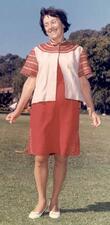
Rivka Sturman
Suburbanization in the United States
Jews migrated in large numbers to newly constructed suburbs after World War II and the end of restrictive covenants that had excluded them. During the day, suburbs were largely female spaces where married Jewish women cared for their children and private homes, while volunteering for Jewish and civic activities. Jewish daughters raised in suburbs enjoyed middle-class comforts but also experienced pressures to conform to American gentile ideals of beauty.
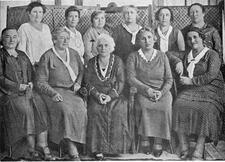
Suffrage in Palestine
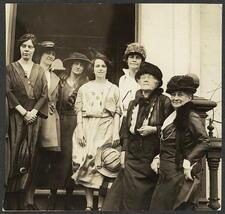
Suffrage in the United States
American Jewish women were heavily involved in the suffrage movement from its earliest days, though mostly as individuals rather than through organizations. Middle-class Jewish women believed the vote was necessary to achieve their broader reform goals, while working-class women hoped enfranchisement would improve their working conditions and economic opportunities. By the time the Nineteenth Amendment finally passed in 1919 the American Jewish community overwhelmingly supported it.


